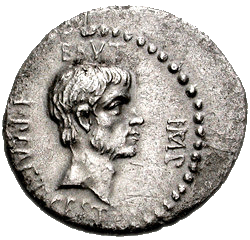
Marcus Junius Brutus was a Roman politician, orator, and the most famous of the assassins of Julius Caesar. After being adopted by a relative, he used the name Quintus Servilius Caepio Brutus, which was retained as his legal name. He is often referred to simply as Brutus.

The Tragedy of Julius Caesar (First Folio title: The Tragedie of Ivlivs Cæsar), often abbreviated as Julius Caesar, is a history play and tragedy by William Shakespeare first performed in 1599.
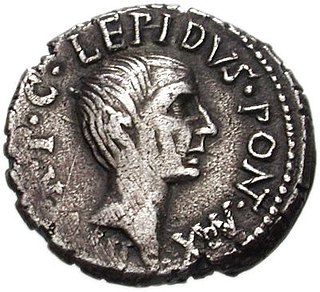
Marcus Aemilius Lepidus was a Roman general and statesman who formed the Second Triumvirate alongside Octavian and Mark Antony during the final years of the Roman Republic. Lepidus had previously been a close ally of Julius Caesar. He was also the last pontifex maximus before the Roman Empire, and (presumably) the last interrex and magister equitum to hold military command.
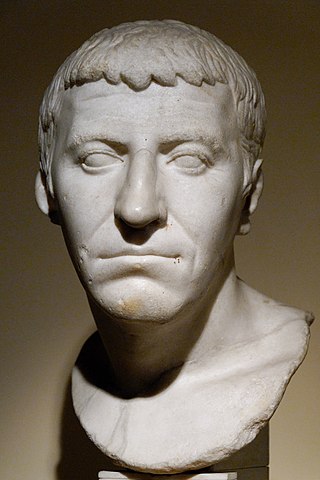
Gaius Cassius Longinus was a Roman senator and general best known as a leading instigator of the plot to assassinate Julius Caesar on 15 March 44 BC. He was the brother-in-law of Brutus, another leader of the conspiracy. He commanded troops with Brutus during the Battle of Philippi against the combined forces of Mark Antony and Octavian, Caesar's former supporters, and committed suicide after being defeated by Mark Antony.
Servilia was a Roman matron from a distinguished family, the Servilii Caepiones. She was the daughter of Quintus Servilius Caepio and Livia, thus the maternal half-sister of Cato the Younger. She married Marcus Junius Brutus, with whom she had a son, the Brutus who, along with others in the Senate, assassinated Julius Caesar. After her first husband's death in 77, she married Decimus Junius Silanus, and with him had a son and three daughters.
Decimus Junius Brutus Albinus was a Roman general and politician of the late republican period and one of the leading instigators of Julius Caesar's assassination. He had previously been an important supporter of Caesar in the Gallic Wars and in the civil war against Pompey. Decimus Brutus is often confused with his distant cousin and fellow conspirator, Marcus Junius Brutus.
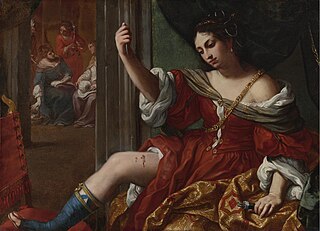
Porcia, occasionally spelled Portia, especially in 18th-century English literature, was a Roman woman who lived in the 1st century BC. She was the daughter of Marcus Porcius Cato Uticensis and his first wife Atilia. She is best known for being the second wife of Marcus Junius Brutus, the most famous of Julius Caesar's assassins, and appears primarily in the letters of Cicero.

Publius Servilius Casca Longus was one of the assassins of Julius Caesar and plebeian tribune in 43 BC. He and several other senators conspired to kill him, a plan which they carried out on 15 March 44 BC. Afterward, Casca fought with the liberators during the Liberators' civil war. He is believed to have died at the Battle of Phillipi either by suicide or by Octavian's forces.
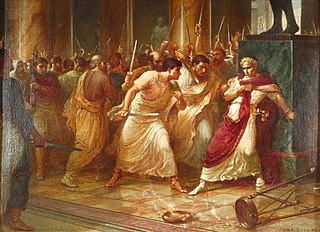
Et tu, Brute? is a Latin phrase literally meaning "and you, Brutus?" or "also you, Brutus?", often translated as "You as well, Brutus?", "You too, Brutus?", or "Even you, Brutus?". The quote appears in Act 3 Scene 1 of William Shakespeare's play Julius Caesar, where it is spoken by the Roman dictator Julius Caesar, at the moment of his assassination, to his friend Marcus Junius Brutus, upon recognizing him as one of the assassins. The first known occurrences of the phrase are said to be in two earlier Elizabethan plays; Henry VI, Part 3 by Shakespeare, and an even earlier play, Caesar Interfectus, by Richard Edes. The phrase is often used apart from the plays to signify an unexpected betrayal by a friend.

The Twelve Tasks of Asterix is a 1976 English/French animated feature film based on the Asterix comic book series, and the third in the animated franchise. René Goscinny and Albert Uderzo, the creators of the series, wrote the story and directed the film themselves; with co-direction by Pierre Watrin and the screenplay co-written by Pierre Tchernia, a friend of Goscinny and Uderzo. The film was directed, produced and animated at Goscinny and Uderzo's own animation studio, Studios Idéfix, and is the only Asterix animated film that used the xerography process. At the time of its release, the film received mixed reviews since its tone is more cartoony and frequently breaks the fourth wall. Nowadays its reception is more favorable, with it often being cited as one of the best Astérix films, even reaching the status of a cult classic.
Allan Johnstone Massie is a Scottish journalist, columnist, sports writer and novelist. He is a Fellow of the Royal Society of Literature. He has lived in the Scottish Borders for the last 25 years, and now lives in Selkirk.

Gaius Julius Caesar, one of the most influential men in world history, has frequently appeared in literary and artistic works since ancient times.

The Ides of March is an epistolary novel by Thornton Wilder that was published in 1948. It is, in the author's words, 'a fantasia on certain events and persons of the last days of the Roman republic. Historical reconstruction is not among the primary aims of this work'. The novel deals with the characters and events leading to, and culminating in, the assassination of Julius Caesar.

Julius Caesar was assassinated by a group of senators on the Ides of March of 44 BC during a meeting of the Senate at the Curia of Pompey of the Theatre of Pompey in Rome where the senators stabbed Caesar 23 times. They claimed to be acting over fears that Caesar's unprecedented concentration of power during his dictatorship was undermining the Roman Republic. At least 60 to 70 senators were party to the conspiracy, led by Marcus Junius Brutus, Gaius Cassius Longinus, and Decimus Junius Brutus Albinus. Despite the death of Caesar, the conspirators were unable to restore the institutions of the Republic. The ramifications of the assassination led to his martyrdom, the Liberators' civil war and ultimately to the Principate period of the Roman Empire.
Marcus Favonius was a Roman politician during the period of the fall of the Roman Republic. He is noted for his imitation of Cato the Younger, his espousal of the Cynic philosophy, and for his appearance as the Poet in William Shakespeare's play Julius Caesar.
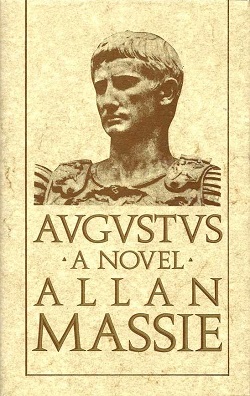
Augustus is a 1986 historical novel by Scottish writer Allan Massie, the first of a highly regarded series of novels about the movers and makers of Imperial Rome. Massie begins with Augustus, the successor to Julius Caesar, who ruled the Roman Empire for forty one years and oversaw the beginnings of an extended peace, the Pax Romana.

Tiberius is a 1991 historical novel by Scottish writer Allan Massie, about the Roman Emperor Tiberius. It is the second in the series of novels Massie wrote about the early Roman Emperors.

Dictator is a historical novel by British author Robert Harris, published in 2015, which concludes his trilogy about the life of the Roman lawyer, politician and orator, Cicero. Dictator follows the first novel Imperium (2006) and the second novel Lustrum (2009). It is both a biography of Cicero and a tapestry of Rome in the time of Pompey, Crassus, Cato, Caesar, Clodius and ultimately Octavian.
Servilia's pearl was a pearl given by Julius Caesar to his favourite mistress Servilia. It was described by imperial biographer Suetonius to be a lone large black pearl worth six million sesterces, making it perhaps the most valuable gem of all time. It may also be the first known individual pearl recorded in human history.













